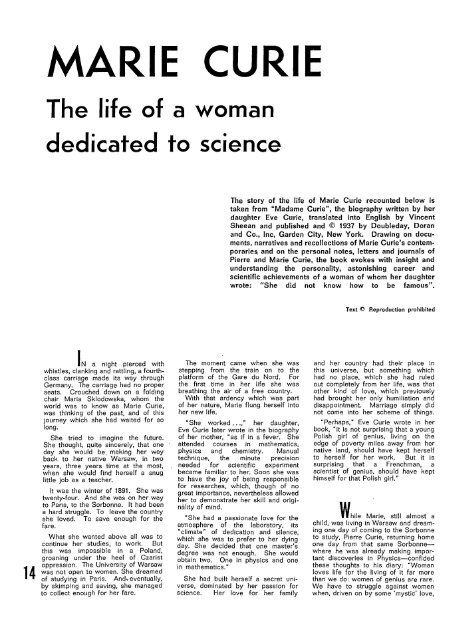Marie Curie; The Unesco courier: a window ... - unesdoc - Unesco
Marie Curie; The Unesco courier: a window ... - unesdoc - Unesco
Marie Curie; The Unesco courier: a window ... - unesdoc - Unesco
Create successful ePaper yourself
Turn your PDF publications into a flip-book with our unique Google optimized e-Paper software.
MARIE CURIE<br />
<strong>The</strong> life of a woman<br />
dedicated to science<br />
<strong>The</strong> story of the life of <strong>Marie</strong> <strong>Curie</strong> recounted below is<br />
taken from "Madame <strong>Curie</strong>", the biography written by her<br />
daughter Eve <strong>Curie</strong>, translated into English by Vincent<br />
Sheean and published and © 1937 by Doubleday, Doran<br />
and Co., Inc, Garden City, New York. Drawing on docu¬<br />
ments, narratives and recollections of <strong>Marie</strong> <strong>Curie</strong>'s contem¬<br />
poraries, and on the personal notes, letters and journals of<br />
Pierre and <strong>Marie</strong> <strong>Curie</strong>, the book evokes with insight and<br />
understanding the personality, astonishing career and<br />
scientific achievements of a woman of whom her daughter<br />
wrote: "She did not know how to be famous".<br />
Text ©<br />
Reproduction prohibited<br />
14<br />
IN a night pierced with<br />
whistles, clanking and rattling, a fourthclass<br />
carriage made its way through<br />
Germany. <strong>The</strong> carriage had no proper<br />
seats. Crouched down on a folding<br />
chair Maria Sklodowska, whom the<br />
world was to know as <strong>Marie</strong> <strong>Curie</strong>,<br />
was thinking of the past, and of this<br />
journey which she had waited for so<br />
long.<br />
She tried to imagine the future.<br />
She thought, quite sincerely, that one<br />
day she would be. making her way<br />
back to her native Warsaw, in two<br />
years, three years time at the most,<br />
when she would find herself a snug<br />
little job as a teacher.<br />
It was the winter of 1891.<br />
She was<br />
twenty-four. And she was on herway<br />
to Paris, to the Sorbonne. It had been<br />
a hard struggle. To leave the country<br />
she loved. To save enough for the<br />
fare.<br />
What she wanted above all was to<br />
continue her studies, to work. But<br />
this was impossible in a Poland,<br />
groaning under the heel of Czarist<br />
oppression. <strong>The</strong> University of Warsaw<br />
was not open to women. She dreamed<br />
of studying in Paris. And* eventually,<br />
by skimping and saving, she managed<br />
to collect enough for her fare.<br />
<strong>The</strong> moment came when she was<br />
stepping from the train on to the<br />
platform of the Gare du Nord. For<br />
the first time in her life she was<br />
breathing the air of a free country.<br />
With that ardency which was part<br />
of her nature, <strong>Marie</strong> flung herself into<br />
her new life.<br />
"She worked...," her daughter,<br />
Eve <strong>Curie</strong> later wrote in the biography<br />
of her mother, "as if in a fever. She<br />
attended courses in mathematics,<br />
physics and chemistry. Manual<br />
technique, the minute precision<br />
needed for scientific experiment<br />
became familiar to her. Soon she was<br />
to have the joy of being responsible<br />
for researches, which, though of no<br />
great importance, nevertheless allowed<br />
her to demonstrate her skill and origi¬<br />
nality of mind.<br />
"She had a passionate love for the<br />
atmosphere of the laboratory, its<br />
"climate" of dedication and silence,<br />
which she was to prefer to her dying<br />
day. She decided that one master's<br />
degree was not enough. She would<br />
obtain two. One in physics and one<br />
in mathematics."<br />
She had built herself a<br />
secret uni¬<br />
verse, dominated by her passion for<br />
science. Her love for her family<br />
and her country had their place in<br />
this universe, but something which<br />
had no place, which she had ruled<br />
out completely from her life, was that<br />
other kind of love, which previously<br />
had brought her only humiliation and<br />
disappointment. Marriage simply did<br />
not come into her scheme of things.<br />
"Perhaps," Eve <strong>Curie</strong> wrote in her<br />
book, "it is not surprising that a young<br />
Polish girl of genius, living on the<br />
edge of poverty miles away from her<br />
native land, should have kept herself<br />
to herself for her work. But it is<br />
surprising that a Frenchman, a<br />
scientist of genius, should have kept<br />
himself for that Polish girl."<br />
w, 'hile <strong>Marie</strong>, still almost a<br />
child, was living in Warsaw and dream¬<br />
ing one day of coming to the Sorbonne<br />
to study, Pierre <strong>Curie</strong>, returning home<br />
one day from that same Sorbonne<br />
where he was already making impor¬<br />
tant discoveries in Physics confided<br />
these thoughts to his diary: "Woman<br />
loves life for the living of it far more<br />
than we do: women of genius are rare.<br />
We have to struggle against women<br />
when, driven on by some 'mystic' love,
















